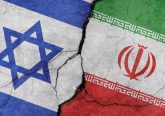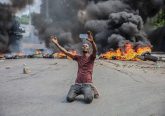Jason Pack and Andrea Khalil in Monday’s Wall St. Journal. Written in Benghazi, Libya– September 11th now signifies a national tragedy not only for the United States but also for Libya. The killing of Ambassador Christopher Stevens in Benghazi during last Tuesday’s attack on the U.S. mission has upset the delicate political transition from dictatorship to democracy that was unfolding here in Libya. It also has obscured parliament’s prudent selection last Wednesday evening of Mustafa Abushagour—a moderate Islamist and respected technocrat—as prime minister. Yet spontaneous street demonstrations throughout the week denouncing the attack and seeking to pressure the government to act against its perpetrators suggest that Libyans are determined to build an inclusive society, free from fear.
On Wednesday night in Tree Square in Benghazi, we witnessed crowds expressing heartfelt disappointment with their own society, shouting slogans like, “Free Libya, Terrorists out!” Saturday Libyan president Mohamed Magariaf told NBC “nightly news” that non-Libyans were among those involved. this dovetails with the widespread view that the attack on the U.S. Mission must have been planned and launched by an al Qaeda affiliate in revenge for the killing of the Libyan-born al Qaeda leader Abu Yahya al-Libi by a U.S. drone in June. Few demonstrators we talked to knew anything about the alleged justification for the storming of the embassy—a hateful 13-minute YouTube video entitled “The Innocence of Muslims.” Among those who did, a minority incorrectly assume that if the video was produced in the U.S., it must represent American public opinion or tacit government policy.
Fortunately, most Libyan popular opinion is more nuanced. Based on our dozens of interviews in Benghazi, it appears that most Libyans are appalled by the attack on the U.S. consulate and by the resulting deaths. One female medical student at a Benghazi demonstration captured the mood we found elsewhere: “The Americans are guests in our country and Islam requires us to treat them well.”
According to a recent Gallup poll, Libyans hold a more favorable attitude toward Americans than even Canadians. This is in Stark contrast to the situation in Egypt, Yemen, and elsewhere, where the storming of the American embassies seems to have been a grass-roots undertaking.
As days have passed since the attack on the consulate, Libyans’ popular condemnation has only amplified. A meeting took place on Thursday evening at the Shbelia Hotel in order to coordinate citizen action against the militants. The people who attended also wanted to goad the government into reining in the myriad militias that fought the struggle against Gadhafi and have since deepened their hold on local politics since his ouster. According to one activist, “There is no government response—because there is no government.”
On Thursday, Prime Minister Abushagour issued a strong statement condemning the attack, expressing solidarity with the U.S., and promising to bring the criminals to justice. This immediately prompted talk of an upcoming government offensive to shut down all the roads in eastern Libya and sweep for militants. Friday, Benghazi’s Benina airport was closed to limit escape of suspects. Despite such high hopes and at least SIXTEEN arrests, experts doubt that the Libyan authorities have the firepower or organizational know-how to tackle the nonstate actors in their midst. Moreover, this attack has further added to the perception that the Libyan government does not effectively control the territory it supposedly governs. By saturday as the grand sweep had not materialized, public pressure mounted for bolder government action.
Civil society and youth activists planned a “Friday to rescue benghazi” demonstration. Tribal sheikhs from across eastern Libya meet to coordinate their local efforts to collect weapons and pressure the government to dissolve militias. all who spoke at the meeting read statements condemning the vile killing of the us ambassador.
Despite the broad-based outpouring of pro-American solidarity, there is a small anti-American minority who support using the video as a public relations stunt to advance their pre-existing militant agenda. Last Wednesday night, they staged a small counterdemonstration in front of the Tibisti Hotel—where most foreigners stay. It consisted of about 50 men with Salafist black banners advocating for more anti-Western violence. On Friday, there were several competing demonstrations taking place around Benghazi. An antimilitant, pro-American demonstration was staged by women in front of the Tibisti Hotel. Partisans of the militant group, Ansar al-Sharia, confronted them, dispersing the peaceful female demonstrators. Fortunately, all such street demonstrations have dissolved without further violence. Symptomatic of everything that is both good and bad in the new Libya, there was no police or governmental presence at any of the protest gatherings we attended.
Given the profound weakness of the libyan government, it cannot fill the security vacuum all by itself. How, then, could there be a silver lining to this tragedy for both the U.S. and Libya? It could prompt Libyans to decisively unite against the extremists and nonstate actors in their midst while also goading the U.S. to increase capacity-building assistance to the Libyan people—helping them construct the requisite institutions for a democratic and prosperous future. In the words of Sen. John McCain, “Libya is wealthy. It does not need our money . . . It needs our technical expertise.” Based on our observation, popular sentiment throughout Libya longs for such increased international cooperation.
Yet the price of Amb. Stevens’ life as a spur to action is too great a cost. We knew him personally and he was the best kind of American diplomat—charismatic, not bureaucratic. He was a young 52 and fluent in the culture of the Arab World. He was in Benghazi from the beginning of last year’s uprising against Gadhafi, and forged irreplaceable personal ties with the top rebel leadership.
Although it is not America’s responsibility to strengthen the Libyan government, the U.S. response will decisively affect its ability to consolidate power. There are three ways the U.S. can respond to the situation now. It can cut and run a la Lebanon 1984. It can conduct a punitive counterterror expedition in coordination with the Libyan authorities—although this will have to rely on Predator drones and hence run the risk of more revenge attacks.
Or, we can practice genuine engagement by helping Libya strengthen its new foundations. Although the U.S. already has a small footprint training Libyan security personnel, engineers and English-language students, such efforts could be increased tenfold. This would help create jobs and get potential extremists and militiamen off the streets.
The future of Libya truly hangs in the balance. If America cuts and runs or lashes out in revenge, security and stability will deteriorate, foreign direct investment will dry up, and the Libyan economy will stagnate.
America wisely played a supporting role in ending the Gadhafi dictatorship. In the struggle for the soul of post-Gadhafi Libya, we cannot be silent. Only intense U.S. engagement can help restore positive momentum to the political transition currently under way.
Mr. Pack is a researcher of Middle Eastern History at the University of Cambridge. He is president of Libya-Analysis.com. Mrs. Khalil is an associate professor at CUNY. She is currently traveling in Libya while on a Fulbright Scholarship to Tunisia.








No Comment